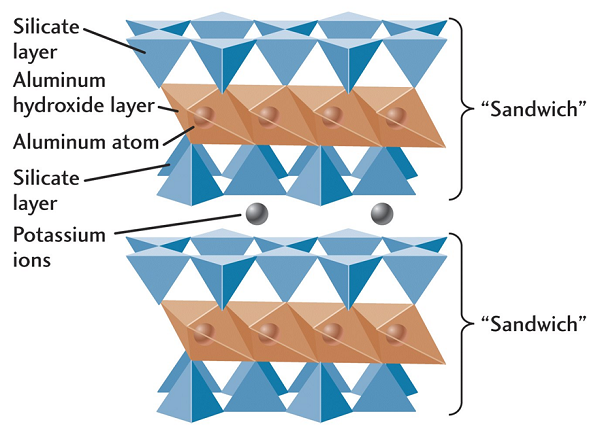
Talc is the softest mineral (occupying place 1 in the Mohs` hardness scale) known on our planet earth. It is lamellar, platy, organophilic, water repellent with special thermal and mechanical properties. It has a high capacity for absorbing organic substances. It is also acid & alkali-resistant, chemically inert and non-toxic. Talc has neither aroma nor taste. This makes it a very essential mineral in our day-to-day life.
Talc is a hydrated magnesium silicate [chemical formula is Mg3Si4O10(OH)2 ]. Also known as Steatite. It is the main component of soapstone. Its crystals usually develop massive, leafy aggregates with laminar particles. Its silicate layers lie on top of one another without having a chemical bond but are bound to each other by weak Vander Waals forces. This structure gives talc the platy appearance and its characteristic greasy or soapy feeling – hence the name "soapstone”.
Chemical Composition
| MgO | 30.0 - 32.5% |
| SiO2 | 64.0 - 66.0% |
| Fe2O3 | 00.5% |
| CaO | 1.5 - 2.5% |
| Al2O3 | 00.6% |
Physical Properties
| Appearance | : White fine smooth powder |
| Sp. gravity | 2.7 to 2.9 |
| Bulk density | 0.5% |
| Whiteness | 94% |
| Oil absorption value | 35 to 40% |
| Hardness | 1 (Mohs) |
| Moisture & Volatile matter | 0.5% by wt. (105 deg.C) |
| Water soluble matter | Max 0.5% |
| PH of 10% aqueous solution | 8 to 10 (ASTM D 1208-65 BS 1795.) |
Minimum 88% combined magnesium calcium silicate.
Industrial Applications
-
Paper
Gives smoothness, brightness to paper & partially replaces TiO2. Also acts as pitch absorber. -
Paints
Highly recommended for wood finishes, primers, putties, undercoateds, architectural finishes, water based coatings. Its laminar structure helps in better corrosion protection and also improves exterior durability of paints. Recommended for expoxy and exterior paints. -
Ceramics
Talc improves resistance to thermal shocks and gives superior electrical properties. It gives greater toughness to speak plugs and switch boards. It also improves dry pressing resistance of ceramic bodies. -
Foundries
Used in mould making and for final finish. -
Plastic & Rubber
Used in variety of application as filler. -
Cosmetics
Super fine talc powder is used in cosmetic for its smooth silky finish.
Our Suggested Talc Grades
| Product name | Particle Size | Whiteness | Brightness | Top Cut | Specifications |
| Talc-Ultra | 2 micron | >92% | >92% | 10 micron | Extremely lamellar, ultrafine talc with enhanced purity and high specific surface area which creates a physical barrier and protects the paint substrate by impairing the diffusion of water and corrosive agents through the film |
| Talc-Super | 5 micron | >92% | >92% | 20 micron | Highly lamellar, superfine, free flowing talc powder. |
| Talc-ST1 | 10 micron | >90% | >90% | 40 micron | Our standard filler grade talc, caters to all kinds of industries. |
| Talc-ST2 | 20 micron | >90% | >90% | 50 micron | A naturally occurring, stable, physically and chemically inert talc product with a natural structure. Generally used as fillers / extruders. |
Apart from above grades we develop tailor made talc to meet the specific requirement of our clients. Our R&D is also working on ultra-fine Talc powders to develop many new products with exciting possibilities.
